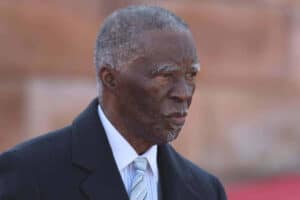Chief Justice Mogoeng Mogoeng asked whether the court would be expected to deliberate on a decision which could've involved political considerations.

The Supreme Court of Appeal’s upholding of a judgment forcing former president Jacob Zuma to provide a record and reasons behind his infamous late-2015 Cabinet reshuffle, could affect whoever is elected into government in the coming poll.
This was the state’s argument in the Constitutional Court yesterday in the matter between the Democratic Alliance and President Cyril Ramaphosa, who took over an appeal of that decision after Zuma’s resignation last year.
State representative Ishmael Semenya argued the decision of the High Court in Pretoria to rule that Zuma must provide the reasons which led him to his decision to fire then finance minister Nhlanhla Nene would set a dangerous precedent.
The decision, should it be upheld, had implications on similar decisions made by executive mayors as well as the nine provincial premiers, he said.
“The crux of the matter here is why the judgment of the high court is simply wrong.” said Semenya.
He was reffering to that court’s application of Rule 53 of the Uniform Rules of Court, which deals with administrative powers, but, as the DA argued and won, could be applied as it pertains to certain executive powers.
The state’s appeal was based on its argument that Rule 53 did not apply to the execution of powers by a president to hire and fire ministers or any executive decisions at that level.
He said should the lower court’s decisions be upheld, it would open up the floodgate for any appointment made through executive powers to be held to the same standard of being subject to the provision of a record and reasons.
The DA’s representative, Geoff Budlender, argued such a rule had to be interpreted in a way which promoted the constitutional principles behind it, and that it could be applied to an executive decision such as the hiring and firing of ministers.
Chief Justice Mogoeng Mogoeng raised a number of concerns in both arguments, asking whether the court would be expected to deliberate on a decision which could have involved political considerations.
Helen Suzman Foundation’s Anton van Dalten said the court would likely avoid encroaching upon powers which had a political element, but concluded that this judgment would nevertheless be an important and precedent-setting one.
“A lot of ministers don’t have qualifications in the field they are ministers of and have no experience in that field. So the question is, do you want the court to get involved in deciding whether they are good or bad appointments? That is what the judgment will clarify,” said Van Dalten.
For more news your way, download The Citizen’s app for iOS and Android.






